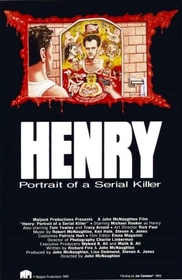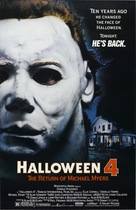Our editor-in-chief Nate Yapp is proud to have contributed to the new book Hidden Horror: A Celebration of 101 Underrated and Overlooked Fright Flicks, edited by Aaron Christensen. Another contributors include Anthony Timpone, B.J. Colangelo, Dave Alexander, Classic-Horror.com's own Robert C. Ring and John W. Bowen. Pick up a copy today from Amazon.com!
Henry: Portrait of a Serial Killer (1986)
The aesthetic differences in director John McNaughton's Henry: Portrait of a Serial Killer are evident from the opening shot. We see the lower part of a woman's face. We can't tell what the context is. Slowly, the camera pulls out from the close-up and we discover that she's lying in a field, dead and naked.
All of the horror--all the violence and killing--in the first reel of Henry: Portrait of a Serial Killer is presented through this technique. The technique is surprisingly effective, and in retrospect, appropriate for the theme of the film. It dissociates the murders from the rest of the action and it displays them as kind of an arty, sculptured presence. The unusual, slow camera pans help create this effect, as does drastic changes in the score as we're shown the bodies. A more active progression of music ceases and instead we hear an austere chord using a choir patch on a sampler.
As you probably know, unless you're unfamiliar with this film and mine is the first review you're reading, Henry is loosely based on at least the confessions of real-life serial killer Henry Lee Lucas. Lucas confessed to killing about 600 people in conjunction with his buddy-with-mental-problems Otis Toole. Many of the claims later turned out to be bogus, however, as some of the supposed murdered even turned out later alive. In other cases, Lucas would have had to race across half the country in a matter of hours in an old, run-down automobile and kill several people along the way.
But Henry: Portrait of a Serial Killer wouldn't have to have any basis in truth to be a great film. Still, part of the brutality conveyed rests on the general truth that there are serial killers out there who pursue their, uh, "hobby" with as much pointless abandon as Henry and Otis.
That the killing is pointless is what makes Henry so effective and disturbing. Most killers in films have some justification for their killing--no matter how much one might disagree with the justification. For example, vampires need blood to continue surviving--and we all understand our inherent need for survival. Zombies are implied to no longer be conscious in a way granting them personhood, and they are also usually shown killing for survival--they have a hunger for brains or other human body parts that keep them alive. Anthony Perkins, in Psycho, had obvious mental problems, and a particular obsession that drove him to kill Janet Leigh; his other murders were mainly to cover up the previous murder. Even killers like Michael Myers, Jason, Freddy and Pinhead have an obsessive purpose that leads them to pursue certain people, or certain types of people. And even other serial killers like Mickey and Mallory in Natural Born Killers at least get kind of a manic, ecstatic enjoyment out of their acts. But Henry is just completely nihilistic. He doesn't have obvious mental problems (although he seems a bit slow), he doesn't have an obsessive purpose in his killings, he doesn't receive any enjoyment from them (but neither do they disturb him), he just kills to kill as nonchalantly as one would go to a convenience store and buy a pack of cigarettes--a point that McNaughton literally makes clear in the film.
As Henry progresses, the display of murders as sculpture stops and sometimes-graphic action sequences of murders commences. These are also brutal and effective, but equally so are scenes such as Otis watching a video they made of one of the murders over and over, the interactions between Henry, Otis and Otis' sister Becky, and well frankly, almost every scene in this film.
While it's not full of typical Hollywood production values, Henry is a quality, well-made film. Attention has been closely paid to all technical aspects, and everything from the editing to the score is excellent. This is really a must see for everyone, especially all horror fans, as it underscores one of the most horrific elements possible--a supreme nihilism that results in random, realistic destruction.









One of the most disturbing